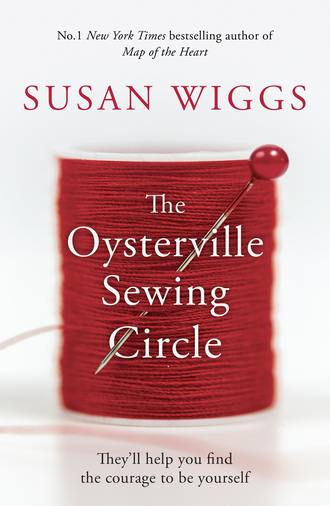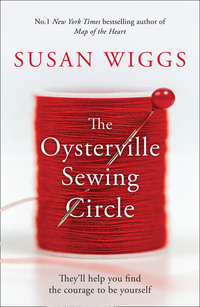
Полная версия
The Oysterville Sewing Circle
In the morning, they went together to the kids’ school. Despite what had occurred the night before, Angelique looked incredible—her damaged lip concealed, fingernails trimmed, hair done, boxy top over skinny jeans with half boots. It made Caroline wonder how many times her friend had hidden the horrors she’d endured.
The children seemed unaware of the drama. They knew only that they were moving, a frequent occurrence in their lives. At the school, Caroline filled out a form designating herself as the children’s guardian and emergency contact. Then she convinced Angelique to go with her to the Lower East Side Haven, a place that provided services to victims. The staff there was discreet and moved with incredible swiftness, offering ways to keep her and her children safe. To Caroline’s surprise, no one pressured Angelique to name her abuser or to turn him in. One of the counselors explained that in the midst of a volatile situation, the priority was safety before justice.
After an exhaustive round of questions, the counselor said, “I wish I had better news. But I have to tell you, there’s a waiting list for accommodations. It’s a sad fact that the need is greater than what we can provide.”
Seeing the anguish on her friend’s face, Caroline took Angelique’s hand. “You and the kids will stay with me.” She turned to the counselor. “We’ll make it work.”
“Coming here was the right thing to do.” The counselor leveled her gaze at Angelique. “It’s incredibly important to have a plan.” She went through it step by step. Gas in the car. A prepaid phone, bought with cash. An emergency fund.
Angelique tensed up when the counselor asked about personal documents—ID, birth certificates for herself and the kids, insurance policies and papers, financial documents. She was caught in the horrible bind that so many undocumented workers with children faced. She could be deported at any time. She might be separated from her children. The prospect made her physically ill; Caroline could see her shaking.
“I’m sorry to have to ask this,” the counselor went on. “Do you have a plan for your children in case something happens to you?”
“The plan is that I’ll be the guardian. I know your kids, Ange. And it’s just a backup, after all.” Caroline tried to sound reassuring.
Angelique stared down at the stack of papers. She held herself very still.
“Every parent is obligated to have a plan, no matter what the circumstances. I know you love your children,” the counselor pointed out. “Have you made a will?”

Caroline’s phone vibrated like a trapped bee against her chest. She ignored it. She was on a city bus, swaying under the weight of a duffel bag stuffed with vintage leather jackets that needed refurbishing. Thanks to Mick Taylor, she had been blacklisted. She had tried to defend herself, blasting Mick on social media, contacting bloggers and reporters. But the situation was all too common, and she was ignored. None of the design houses in the city would hire her, so in order to make the rent, she had to take in piecework the way she used to do when she was in design school.
It was a huge step backward. Many steps, in fact. After crawling forward for years, she’d been knocked all the way back to square one. Thinking about all the time and effort she’d poured into getting this far in her career, she wondered what the point was now. There were moments when she wanted to give up, to curl into a ball and wail about the injustice of it all.
And then, with the same dogged determination that had driven her to New York, she forced herself through those moments. Sometimes it felt like she was dragging herself from one side of the moment to the other through a pit of mud.
Then she would picture Mick’s smug, patronizing face, and the image would help her find the fire once again. How could she ever have thought he was her mentor, her mild-mannered surrogate uncle? He might have copied her designs, but she refused to allow him to steal her dream. And despite his status in the fashion world, he and his design director knew what they had done, whether they admitted it or not.
The trouble with being a design thief was that he would forever be in the trap of having to steal. Caroline knew she had an infinite variety of designs inside her. A thief was limited to those he could appropriate from others.
“You are an empty soul, Mick Taylor,” she muttered under her breath. “As empty as—”
The phone vibrated again. She wrenched it out of her pocket, but missed the call. As empty as my bank account. Christ.
She exited the bus as the phone vibrated yet again—another notification of an incoming call and a voice mail. She didn’t recognize the number. Maybe for once it would be good news. God, wouldn’t it be nice if she found a gig?
She ducked inside her apartment building to escape the street noise. The usual pile of junk mail had escaped the too-small boxes and littered the foyer of the building, which always seemed to smell like soup. Nothing of note. Coupons, credit card offers, her Con Ed bill with a U-shaped heel mark where someone had stepped on it, stamping it with the honeycomb tread of a high-end Apiary shoe.
She threw the mail on top of her duffel and lugged it upstairs, then set it down to let herself in. The door wasn’t locked, which rankled her. Since Angelique and her kids had come to stay, Caroline’s tiny space was even more crowded than ever. “Hello?” she called.
The apartment was quiet. There was … something. Something was off. Caroline couldn’t quite place the niggling sensation that prickled across her skin. It was subtle, just a peculiar heaviness in the air. An unfamiliar scent.
“Oh, hey, Angelique,” she said, shaking off the feeling.
Her friend was napping on the overstuffed sofa. She didn’t stir. Her routine was erratic sometimes, although each day after getting the kids off to school, Angelique went to church at Saint Kilda’s. It was just something she did, and she seemed private about it, so Caroline didn’t ask questions.
“Ange.” Caroline dragged the duffel into the room. “Hey, girl,” she said. “You left the door unlocked. Bad idea to—” Her phone buzzed again, and this time she picked up. “Hello?”
“This is the attendance clerk at Sunrise Academy,” said a voice. “We haven’t been able to get hold of Ms. Baptiste, and her children are waiting to be picked up. Your number is listed as an alternate contact. Would you have any idea where she is?”
“As a matter of fact, I just walked in the door, and she’s here.”
“Oh, good. Can you tell her to come right away? Unfortunately, it’s late and no one can stay with Ms. Baptiste’s children.”
“I’ll tell her,” Caroline said, feeling a twinge of annoyance as she rang off. How could Angelique forget her kids? “Hey, girl,” she said. “You need to get over to the school, stat. Your kids are waiting.”
Angelique still didn’t wake up. She didn’t move.
Caroline felt a weird knot of apprehension in her gut. Crossing the cluttered room, she swept aside the window drape and looked at her friend.
“No.” Her voice was a low plea of disbelief. “Dear God, no.” She froze for three beats of her heart. One—the angle of Angelique’s head. Two—the ashy pallor of her skin. Three—some kind of drug paraphernalia on the floor.
Caroline didn’t scream. Not out loud, anyway.
Then she stumbled back and dove for her phone.
While law enforcement people and paramedics swarmed the place, Caroline shook with unbearable fright. She answered the first round of questions with wooden, disjointed replies. Then she rushed to the bathroom and threw up.
Someone from the medical examiner’s office came. More questions. All signs pointed to an accidental drug overdose, to be verified by a toxicology report. Overdose? How could there be an overdose when Angelique didn’t use drugs?
“It happens,” a guy said, standing over Caroline as she hyperventilated. “Addicts know how to hide things.” He said the body would be removed by the ME and an investigative report would be prepared.
She couldn’t take it all in. Words like the body and the deceased had never been uttered before in her presence. Angelique, an addict? How could that be?
She managed to call the school again. Tried to choke out an explanation of the inexplicable. She arrived at the school just as darkness was settling over the city. The principal was there, along with a social worker. Flick and Addie, in their little tartan and navy uniforms, were in the main office, eating Goldfish crackers and watching a kids’ show on a laptop.
Caroline forced herself to stop shaking. She went into the office and sat on the floor next to them. “Hey, you two,” she said, her voice a bit too bright.
“Want some Goldfish?” Flick held out the container.
“No, thank you.” She closed the laptop. Looked at the principal and social worker, who stood by. “I’m here because something happened to your mama,” she said. Good God. “It’s terrible news. Addie, Flick.” She drew them close, their tiny warm bodies feeling so fragile. “The worst possible thing happened. Your mama died today.”
Addie tilted her head to one side. Then her sweet face crumpled. “She can’t be dead. I don’t want her to be dead.”
“Nobody does. She would never leave you on purpose. It was an accident. She took a bad drug and it caused her to die. You won’t be able to see her anymore, but you’re safe with me.” Every word felt wrenched from her. “I’m so sorry it happened. So very sorry. We’re going to be sad for a long time, but I’ll take care of you.”
Flick pounded the Goldfish into crumbs. His face was blank with bewilderment. “Where’s Mama now?”
“They took her to a special place,” Caroline said. “They have to check and see exactly what caused her to die. And then … I’m not sure.” She sent a helpless look at the social worker. Addie dissolved into tears. Flick, just a year older, scooted over next to his sister and put both his arms around her.
“Where are we going?” asked Flick. “Are we going home?”
According to the emergency caseworker, the child protective services system would take them in if there were no other alternatives. The caseworker also said the system was beyond overburdened. There were more children in need than the department could handle. There were emergency foster homes, but that was a temporary measure. The caseworker told Caroline that lacking a guardian, Flick and Addie would be placed among strangers, possibly separated.
It took Caroline about two seconds to nix that idea. She absolutely could not abide the thought of these poor kids thrust into the unknown, their already traumatized hearts shredded, possibly beyond repair. “They’re staying with me,” she declared. “Tell me what I have to do.”
A social worker helped her file a petition for emergency guardianship. With both children in tow and no money for a lawyer, she showed up in court for a hearing. The social worker said there would be no need for a lawyer, since there was no one to dispute guardianship. The boxy, high-ceilinged room was crowded and noisy, and the kids huddled close on a bench until it was their turn. A family court advocate explained that it wouldn’t be a full formal hearing, and that the orders would be temporary.
The judge looked harried, though not overwhelmed. Just … resigned and sympathetic. He regarded her thoughtfully, studied the police report, then each of the children. “I’m very sorry for your loss,” he said. “I’ve read over everything personally in this case. Ms. Shelby, thank you for submitting your information so quickly.”
There had been a mad scramble for the school’s affidavits, custody evaluations, a notarized will, the police report, and the coroner’s findings. A social worker had visited Caroline’s apartment—so small, but deemed adequate to accommodate the children. While the judge shuffled through a file of papers, Addie’s teacher showed up and escorted the kids out into the hall.
Good, thought Caroline. She didn’t want them hearing what was likely to be said about their mother.
“What was your relationship to Ms. Baptiste?”
“She was my friend, Your Honor. We work—worked—in the same industry and … we were friends. Close friends.” Caroline took a deep breath, trying to ignore the bumping and whispering of other people in the courtroom. “We met as colleagues. Angelique was a model, and I’m a designer. She came to me on the night of March twenty-third with injuries from a fight. She wouldn’t call police and she wouldn’t say who hurt her. I don’t believe the kids know, either. She and the children stayed at my place. I agreed to be designated as guardian in case something happened to Angelique. I never dreamed the situation would arise.”
“Were you aware of her drug use?”
“Not at all,” Caroline admitted. “I had no idea. I still can’t believe it.”
“And yet she died in your apartment of an overdose of intravenous drugs.”
She looked up at the judge, her chest tight with anguish. “I’m no expert, but I can tell you I never noticed a single sign of that. Angelique was one of the best models in the industry. She worked hard. She loved her kids and they adored her. I wish I’d known. I wish I could have done something. Your Honor, the only thing I can do for my friend now is take care of her children.”
She thought again of Roman Blake. He’d been questioned by the police, and it was found that he had a criminal record, but he was released based on the fact that there was nothing to tie him to Angelique. He had no legal claim to the children, but Caroline was fearful of him. She needed to protect Flick and Addie.
“You understand fully that you’re making a serious commitment in every way—financially, emotionally—”
“I do understand. It’s a lot. But there’s no one else. She has no living family. I can do this, Your Honor. I always said I’d be there for her.” She snapped her mouth shut, reminding herself not to babble.
“You’re currently unemployed. Is that correct?”
“No,” she said, her chin lifting in self-defense. “I’m working independently.”
“According to your recent bank statements, you’re not bringing in enough money to support yourself, let alone two children. We need to know your plan, Ms. Shelby.”
She had lain awake half the night, agonizing over her decision. Referring to the documents she’d submitted to the custody evaluator, she said, “My plan is to take Flick—Francis—and Adeline to my home state of Washington. We will be staying at my family home where I grew up in the town of Oysterville.”
The judge studied the documents. “I’ve read the statements you provided from Dorothy and Lyle Shelby. Your parents?”
“Yes, sir. Your Honor.” When Caroline had called them in a panic, they had not hesitated, bless them. Bring those poor children home, her mother had said. We’ll sort everything out once you get here.
Assuming the judge would allow it. He looked over more papers, taking his time, making notes. Caroline scarcely dared to breathe. So far no one had asked about Angelique’s immigration status or that of the children for fear of introducing even more complications and a new round of bureaucratic horrors. Don’t ask, she silently pleaded. Please don’t ask.
The judge put aside the file and studied Caroline for a long time. “The reports do say you appear to be providing a safe and supportive situation for these children. I’m going to sign this order. I’m going to grant you emergency custody, and I will allow you to take the children to Washington, provided you commit to certain conditions.” He enumerated her duties to provide information through official channels. “I wish you the best, Ms. Shelby. I anticipate that the probate court will honor Ms. Baptiste’s will unless you’re found to be grossly unfit.”
“Thank you, Your Honor. I’ll take care of them.” Although she tried to infuse her voice with confidence, Caroline was terrified. There were moments—many of them—when she did feel grossly unfit. She was about to change her life forever, heading down a path she’d never foreseen.

You will never be completely at home again, because part of your heart always will be elsewhere. That is the price you pay for the richness of loving and knowing people in more than one place.
—MIRIAM ADENEY

Running into—literally running into—Caroline Shelby on a random foggy morning threw Will Jensen off his game.
Not that he had game, but he had athletes in training. Their morning run had been interrupted so unexpectedly that after the strange chance encounter, Will sent the team to the locker room early that morning. He offered an extra high five to Gil Stanton, the guy who had spotted the lost little girl asleep in the car.
Will tried to get his head around the idea that Caroline “I’m never having kids” Shelby had two kids. How did he not know that? How had he not heard anything through the grapevine?
One thing he did know—though not from experience—was that a missing child was every parent’s worst nightmare.
“See you in class, Coach,” said Augie Sandoval, the captain of the cross-country team.
Will drained his water bottle and headed back to the athletic compound, where his office was located. He flipped on the coffeemaker and turned on his laptop. There was a small private shower room for the coach, closer and more convenient than going back home to get ready for the day. Besides, Sierra had been up late the night before, and he didn’t want to wake her.
These days he took a lot of showers at work.
After the brutally short, not-even-lukewarm showers he’d endured during his service in the navy, a long blast of hot water was a luxury that never got old. While indulging in the morning ritual, he usually thought about his day—algebra, trig, vo-tech, office hours. After school, there would be one or more of the ubiquitous meetings—planning and development, compliance, community outreach—a couple of which he had somehow managed to be appointed to chair.
Then home to work on the house. Another consuming project, but that one was a labor of love. After his discharge following the injury, he had pursued a different dream—restoring the generations-old family home known as Water’s Edge. The rambling Carpenter Gothic had been built by his ancestor, Arne Jensen, an oysterman who made a living shipping fresh oysters to the Bay Area during the years of the Gold Rush.
Will had spent the summers of his boyhood with his grandparents in the old house on the generous green parcel, with its big barn, oyster sheds and docks, and fleet of dinghies and powerboats. Over time, the house had deteriorated, and when his grandparents had retired to Arizona, they’d deeded the place to Will. He’d always dreamed of restoring it to its former glory.
Today he had something else on his mind—Caroline Shelby. He wished he didn’t know that it had been ten years since he’d last seen her. He wished he didn’t know the exact date he’d watched her drive away, tires spitting crushed oyster shells in their wake—the day he’d married her best friend, Sierra Moore.
But he did know, and that bugged the shit out of him.
He wondered what she was doing back here. She was supposed to be living large in New York City, making her name as a famous designer. He hadn’t thought about her in years, and suddenly there she was, clearly exhausted and stressed by her two little kids—damn, two kids—and an old car crammed with baggage. Despite the circumstances, Caroline still looked like the girl he’d known for most of his life—small and intense, her mouth like a red valentine, her movements quick with agitation, her cropped, mussed hair streaked with crazy neon highlights like one of his high school kids.
The town being what it was, local gossip was bound to fill in the answers to the questions buzzing through his mind. Mainly, the kids. A girl named Addie. A boy named Flick. What the hell? Where was their dad?
Apparently, Caroline had been busy with more than her career.
With steam swirling around him, he stepped out of the shower and groped for a towel.
“Here you go.” Someone placed it in his hand.
“Jesus.” He snatched the towel and jumped back. Then he recovered, leaned forward through the dissipating steam, and kissed his wife—lightly and briefly, so she wouldn’t remind him not to muss her makeup. “Hi, babe,” he said. “You’re up early.”
“Heading down to Portland,” she said. “I stopped in to say goodbye.”
Again?
“The fall catalog shoot,” she reminded him, stepping out of the tiny cubicle.
He scrubbed his head to dry his hair. “Fall, huh?”
“In the fashion world, the seasons are reversed, remember?” She wiped the fogged shaving mirror with her sleeve and leaned in to inspect her face. “Miriam Goddard was asking me where I get my hair done. Was that a veiled insult, do you think?”
“I don’t get it. Your hair’s perfect, like the rest of you.”
Her smile was fleeting. “I’ll take your word for it. We live in a fishbowl here. I feel like everyone has an opinion about us.”
He let the towel drop and reached around behind her. “You’re always complaining about the town gossips. Let’s give them something to gossip about.”
She pushed her hand against his chest. “Very funny. You need to get to class, and I need to get on the road.”
“Let’s be late.”
“Let’s not.” She patted him lightly on the shoulder, then stepped out into the office. “You can’t get away with anything in a town like this.”
“I like small-town life,” he said, dressing quickly. “I like the slow pace, the sense of community.”
“The sense that everyone knows everyone else’s business,” she said. “Trust me, being Pastor Moore’s only daughter was no picnic. You were a navy brat. You have no idea what it’s like, having to make sure you don’t embarrass your parents.”
Sierra sometimes chafed under the scrutiny, but Will was philosophical. “Good thing we’re old enough now, and married. Nothing for folks to see here, simple as that.”
“It’s not so simple,” she said. “Some people will always find something to gossip about.”
“Could be you’re right.” He came out of the bathroom with his tie slung around his neck. “Remember that summer your dad caught us making out in the choir loft? I had my hand up your—”
“Knock it off,” she said, removing his hand. Then she stepped forward and tied his tie for him in a now-familiar ritual. “You headed back to the city, and I was left to face the consequences.”
“Come on, we had fun. Your folks are my biggest fans now.”
“Indeed. Sometimes I think they like you better than me.” She was all done up as usual, her hair gleaming, makeup airbrushed to perfection over a forehead smoothed by Botox injections she insisted she needed.
“Guess you have a busy day lined up,” he said.
“Yep. Interior and exterior shots today.” She smoothed his collar and stepped back.
“Sounds good. So you’re going to put on pretty clothes and knock ’em dead,” he said.
“Right.” Her too-smooth brow tried to frown. “The world’s oldest model.”
“Only my ninth graders think thirty-four is old.”
“News flash—the entire fashion industry thinks thirty-four is old.”
He knew better than to argue with any female about the fashion world. But damn. Despite the accident that had taken one eye, his good eye could see perfectly well that his wife was gorgeous. The kind of gorgeous that made people do a double take, the way they might when a perfect rainbow appeared in the sky. She had shiny red hair and a tall, slender body, green eyes that gleamed like rare jewels. Her face had graced ads for toothpaste, cat litter, fine perfume—anything that could be marketed alongside a pretty face.









